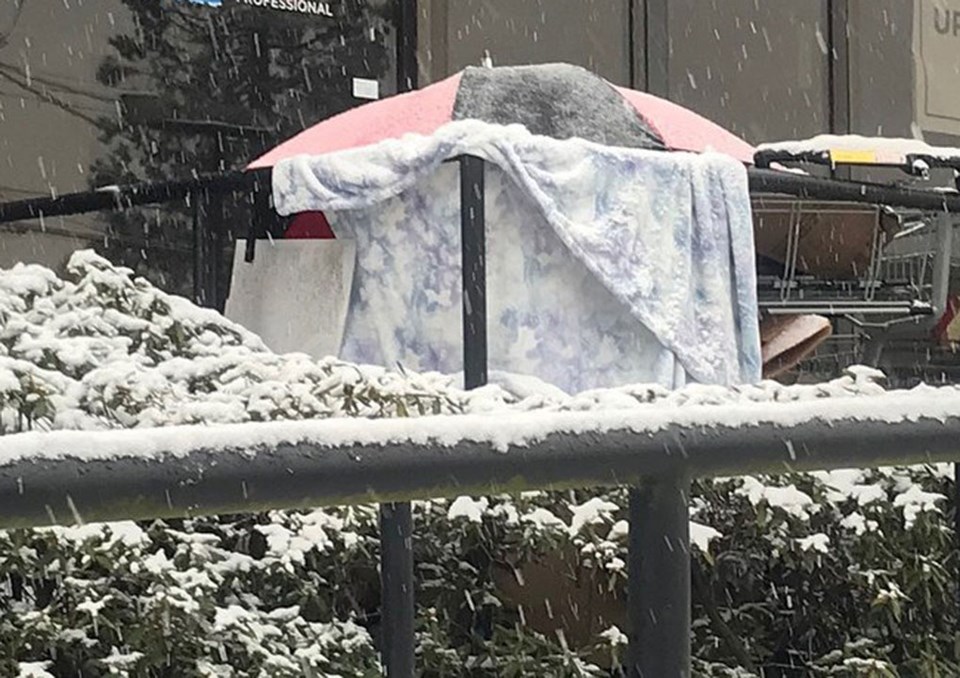Is it time for Delta to have a year-round 24/7 homeless shelter or around-the-clock temporary weather shelters?
A recent city staff report to council on the city’s extreme weather response gave some numbers on how the extreme weather shelter (EWS) in South Delta and the new one in North Delta were utilized last year.
At the municipal level, emergency overnight accommodation is provided through the BC Extreme Weather Response (EWR) program. That program supports community-based services to provide temporary emergency shelter spaces for people experiencing homelessness during periods of extreme winter weather, between October and March.
BC Housing funds Homelessness Services Association of BC to manage the EWR program in various communities including Delta.
For the past several years, the Ladner United Church, in partnership with Options Community Services, has provided an overnight extreme weather shelter for homeless people in South Delta during periods of extreme snow, cold or rain.
A second extreme weather shelter facility opened late last year as the city worked with the Homelessness Services Association of BC and other community organizations to establish one in North Delta.
The Leadership Council of New Hope Church on 88 Avenue offered to provide that space and partnered with Phoenix Society to operate the overnight facility.
The Ladner site could accommodate up to five guests last season.
It had a nine bed-capacity prior to the pandemic forcing a reduction to comply with public health orders.
The New Hope Church facility could accommodate 20 guests.
The report notes that over the last three years, Delta has seen a marked increase in the number of nights during which the Ladner shelter is open, meaning that there are more nights of extreme cold, rain or snow.
“In addition, the first months of operation of the North Delta shelter experienced a significant and steady rise in the number of clients, with many nights when the facility was at capacity and people had to be turned away. During the 2021-2022 EWS season, there were 675 guests in North Delta shelter and 360 in South Delta,” the report notes.
“Due to an increased demand and challenges with staffing part time, overnight staff, the decision was made to keep both extreme weather shelters open for the month of March. On average, the North Delta shelter had 15 to 20 guests per night.”
Open from Dec. 15, 2021 to March 31, 2022, the North Delta shelter was open 89 nights and closed for five.
The South Delta facility was open Oct. 29, 2021 to March 31, 2022. It was open total 128 nights, up from 97 nights two seasons earlier, while it was closed from 26 last season, down from 55 nights closed two seasons earlier.
The total visits to the South Delta shelter were 360 this past season, while it was 433 the previous season and 250 the during the 2019/20 winter season.
Delta has no temporary winter shelter that operates 24/7 during cold weather seasons.
The report also notes that the seasonal nature of the EWS program means that homeless people in Delta may be left without overnight accommodation during extreme weather events between April and September unless they are able to access a 24/7 permanent shelter elsewhere in Metro Vancouver.
Delta council recently approved a staff recommendation to have designated municipal facilities in North Delta, Tsawwassen and Ladner identified as 24/7 cooling centres. Those would only be open during Level 2 BC Heat Alerts.
Designed to meet the emergency housing needs of individuals and families, there are also no permanent all-year 24/7 homeless shelters in Delta, and no permanent programs for unhoused populations, or those at risk of being evicted in Delta.
“Staff continues to work with community partners to improve community capacity to support unhoused populations in Delta and those at-risk of being homeless,” the report adds.
Some proposed actions are listed in a draft of Delta’s Social Action Plan presented to council last December.
Among them is the city advocating to senior levels of government to secure funding for the summer extreme weather shelter season to mitigate the impacts of heatwaves and poor air quality.



